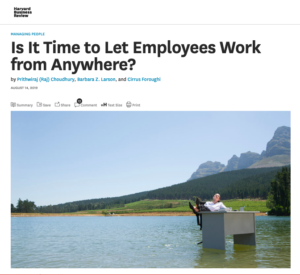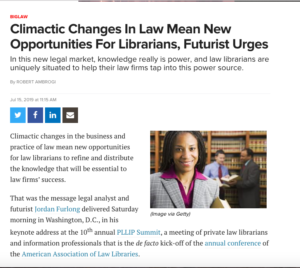Gerald A. Riskin's Blog, page 5
October 8, 2019
Flexibility a Key to Employee Satisfaction – Even in Law Firms
 Writing in Inc., leadership specialist Marcel Schwantes predicts that traditional companies that want to hire and retain “the best” will need to adopt a principle set out by Microsoft founder Bill Gates several years ago: they will need to get more flexible.
Writing in Inc., leadership specialist Marcel Schwantes predicts that traditional companies that want to hire and retain “the best” will need to adopt a principle set out by Microsoft founder Bill Gates several years ago: they will need to get more flexible.
As we discussed in a previous post, many valuable employees are looking for opportunities to work remotely from the physical locations of their employers’ companies, either at home or in other places of their choice. Schwantes expands on this idea, pointing out that “Remote work options will attract top candidates tired of the financial burdens that come with long commutes, train/bus fares, onsite childcare, and expensive housing in large metro areas. […. T]he average person can save $7,000 per year by working remotely, according to TECLA.”
Employees are not the only sector that can save money with flexible working arrangements: employers can as well. These employers also enjoy greater productivity from their personnel, which further improves the bottom line.
Traditional companies (such as many law firms) are failing to take advantage of the cost benefits and improved rates of employee satisfaction that are increasingly shown to result from flexible work arrangements. I recommend not only Schwantes’s post, but that you follow the TECLA link he provides: there you will find some interesting statistics about the benefits of remote work in the IT industry.
What are the up- and down- sides of creating a less traditional and more flexible work environment at your firm/company? I would be interested to know your thoughts on this or any other matter relating to the management of your law firm. You can contact me either in the comments section below, or directly via email.
September 30, 2019
Tech “Incubator” for Smaller Law Firms Launched in Austria
 The Artificial Lawyer reports that a group of smaller firms in Austria – most with fewer than 100 lawyers – are applying a “business incubator” approach to the technological growth of their legal practices.
The Artificial Lawyer reports that a group of smaller firms in Austria – most with fewer than 100 lawyers – are applying a “business incubator” approach to the technological growth of their legal practices.
Smaller law firms often do not have the time and money necessary to accelerate their firms’ technological expertise. But The Artificial Lawyer reports that “By pooling resources between seven firms, and then bringing in the support of local universities and other bodies, [Austrian law firms] which include major local brands such as Dorda, Schönherr and Wolf Theiss, have been able to put together what they may not have been able to do on their own.”
Their group, called the Legal Tech Hub in Vienna (LTHV), recently completed its first “incubator cohort,” which involved working with companies from around the world that specialize in such areas as contract management and tax information technology, case preparation tools, and “access to justice” (A2J) platforms.
The Artificial Lawyer interviewed members of the group regarding what they have achieved so far, and their plans for future cohorts. If you can envision working with other law firms to accelerate your firm’s proficiency in legal technology, efficiency or other areas related to legal practice, I highly recommend the article.
I welcome your thoughts on this or any other matter relating to the management of your law firm, either in the comments section below, or directly via email.
September 23, 2019
Make Greater Use of Technology, Lord Mayor Advises UK Legal Sector

Screen capture: The Artificial Lawyer, July 3, 2019
Earlier this summer, the Lord Mayor of the City of London reminded those gathered for the City’s annual judges’ dinner that ‘The Law Society has found that adoption of technology amongst UK legal firms remains limited, meaning that the capabilities and benefits of these technologies are yet to be fully harnessed.”
Peter Estlin noted that while many firms have begun to adopt new technology in specific areas, more was needed. “We must ensure our legal sector matches [the] global trend, driving innovation and modernising our infrastructure to enable our judiciary to cater for the clients of the digital age,” he said.
His speech included an announcement of a new Combined Courts facility. “[T]his new court will be dedicated to tackling cybercrime, fraud and economic crime, demonstrating our ability to deal with the changing nature of crime in the 21st century,” the Lord Mayor said.
In writing about Estlin’s speech in advance of its delivery, The Artificial Lawyer (UK) pointed out that “at present the UK appears to be doing all it can to support the adoption of new legal technology, including at a regulatory level, but it never hurts to have the City of London and its Lord Mayor fighting your corner.”
A note to readers not based in the UK: The Lord Mayor of the City of London is the elected head of the financial and business sector of metropolitan London that is known as “The City,” or more accurately, “the City of London Corporation.” This is a different position than the one entitled “Mayor of London,” which refers to Greater London and is currently held by Sadiq Khan.
As always, I encourage you to contact me with your thoughts on this or any other matter relating to the management of your law firm, either in the comments section below, or directly via email.
September 16, 2019
Riskin’s “Amazing Firms, Amazing Practices” Named a Top Blog to Follow
 I was recently honoured to find Amazing Firms, Amazing Practices on a list of “13 blogs legal marketers should follow.” The list was compiled by Steven Gallo, content-marketing manager at Reputation Ink – a content marketing and public relations agency for legal and B2B companies – and writer/editor at the InkSights blog.
I was recently honoured to find Amazing Firms, Amazing Practices on a list of “13 blogs legal marketers should follow.” The list was compiled by Steven Gallo, content-marketing manager at Reputation Ink – a content marketing and public relations agency for legal and B2B companies – and writer/editor at the InkSights blog.
Gallo argues that “if you want to be a better legal marketer and produce results that get noticed by your supervising attorneys, don’t stop learning. Stay current by following thought leaders and reading blogs that share what’s new and what’s next in legal marketing.”
Ours is one of the blogs he suggests you read, but it’s certainly not the only one. Check out the post and find out who else you should be following.
As always, I encourage you to contact me with your thoughts relating to the management of your law firm – or law firms in general – either in the comments section below, or directly via email.
September 9, 2019
The Value of Intellectual Humility
In his most recent Pinkcast, Daniel H. Pink says, “Intellectual humility is in short supply today. And that is a big big problem.” He defines intellectual humility as “the willingness to recognize that what you think, what you believe, might be wrong.”
In the video, Pink poses four questions from a book he admires by Warren Berger: The Book of Beautiful Questions: The Powerful Questions That Will Help You Decide, Create, Connect, and Lead.
These are the questions:
“Do I think more like a soldier or a scout?
“Would I rather be right, or would I rather understand?”
“Do I solicit and seek out opposing views?”
“Do I enjoy the pleasant surprise of discovering I’m mistaken?”
I believe this very short video might contribute a lot to executive teams, management teams and to each of us individually. An executive committee might watch this together and then take five minutes to discuss the four questions Pinker poses.
As always, I encourage you to contact me with your thoughts on this or any other matter relating to the management of your law firm, either in the comments section below, or directly via email.
September 3, 2019
Employees Who Work Remotely Can Help the Bottom Line
 In a recent article in the Harvard Business Review (HBR), Prithwiraj (Raj) Choudhury, Barbara Z. Larson and Cirrus Foroughi share 2017 Gallup Poll and 2018 US Census data indicating that about 40 percent of U.S. employees work from home at least some of the time, and that about 5 percent work exclusively from home. The trend toward “work from home” (WFA) agreements between businesses and their employees is clearly on the rise.
In a recent article in the Harvard Business Review (HBR), Prithwiraj (Raj) Choudhury, Barbara Z. Larson and Cirrus Foroughi share 2017 Gallup Poll and 2018 US Census data indicating that about 40 percent of U.S. employees work from home at least some of the time, and that about 5 percent work exclusively from home. The trend toward “work from home” (WFA) agreements between businesses and their employees is clearly on the rise.
The authors then go on to explore the implications of another increasingly popular option: “working from anywhere” (WFA). WFA employees, the article says, “live and work where they choose, typically within a specific country, but in some cases, anywhere in the world with a reliable internet connection.” Employees who want to move closer to aging parents or to a less expensive part of the country, or even closer to where they eventually hope to retire, are among those welcoming this approach. The article names Akamai and SAP as companies that have successfully incorporated WFA into their workplaces.
While employers often express concerns about potential declines in quality and productivity if employees are not on site, surveys of WFH and WFA both reviewed and undertaken by the authors contradicted these assumptions. In most cases, productivity actually went up. In addition, the introduction of remote-work options may lead to happier employees: in one survey cited in the article, workers said they would be willing to take a drop of up to 8% in income to have the opportunity to work from home.
Choudhury, Larson and Foroughi have not only included an array of interesting and useful statistics, they have also compiled an excellent list of guidelines for employers who are considering (or are already making use of) off-site work arrangements with employees. I recommend it highly.
In the meantime, I would be interested to know your thoughts and experiences with remote-work arrangements with your employees (or, of course, any other matter relating to the management of law firms), either in the comments section below or directly via email.
August 22, 2019
The Focus Challenge – Part I: Your Practice
Note: This article first appeared in the August, 2019 issue of Edge International Communiqué (EIC).*
 1. Substantive Practice
1. Substantive Practice Gone are the days when some level of specialization in an area could sustain a practice over a lawyer’s lifetime. Things are changing too fast and new competitors will emerge – some of them not even law firms.
In the meantime, what you can do is think about the future of both your practice area and the clients you serve.
We’ve been using the following life cycle S-curve for a long time. It was borrowed from industry and the legal profession has embraced it gradually over the last number of decades. The graph applies to both your substantive practice, and the client you serve within it.
The S-curve may be applied to your practice, your firm, your practice area, your client, an industry, or all of the above. Most work gravitates to the right side of the curve where rates are low and competition is high, as opposed to the left where exciting emerging areas afford major strategic opportunities with few competitors and low resistance to fees. Therefore, it is necessary to be forward-thinking.
2. The Business of Law in a Digital World
I am asked by people at international associations of law firms, and sometimes by those at individual firms, “How is the practice of law changing? What do I need to know, and how do I keep up?”
The oldest members of your firm might remember when firms began to use computers for data-processing. All lawyers will remember the accelerating change of technology — from how word-processing is done to how documents are generated.
Today, with machine learning and what is commonly referenced as “artificial intelligence,“ the quality of documentation is ever-enhanced, while the cost of generating it decreases.
Many firms seem unaware that they now exist in a digital environment that needs to be nurtured. Firms are now rated on-line whether they like it or not, and enlightened firms are fostering more positive reviews.
This is not the place for a deep dive on the subject, but it is a caution that firms that are not making a considerable effort to learn the changing technology around them – and to embrace it – will soon be left behind.
3. The Firm
Well-managed firms outcompete poorly managed firms. Firms with a business plan outcompete firms without a business plan. Why then, at conferences where managing partners gather, do we see by the use of anonymous voting machines that the vast majority of firms don’t have a business plan? (I’m referring to a sample across a wide spectrum of firm sizes. If you’re thinking that the top 25 firms in the world likely have a plan, you are correct.) Firms that do not see the benefit of managing the business of law are being left behind.
The better firms train their leaders on how to get improved performance from their people. The better firms train their individual lawyers on client-relations skills so they can give greater satisfaction to their clients and attract more desirable work, both in traditional ways (via personal relationships) and in digital ones (through an online presence).
_____
* In the next two parts of this series, I will challenge readers to focus on their clients (Part 2) and their families (Part 3).
Each month, EIC publishes items of interest to lawyers around the world on various aspects of law-firm strategy, marketing, technology, management, economics, human relations and a host of other topics. In addition to the most recent edition, the EIC site includes a sign-up page for those who are interested in subscribing to EIC, as well as a list of archived articles.
I’d be happy to discuss any of the component pieces of this article in greater depth. I welcome your thoughts and feedback on both Edge International Communique and Amazing Firms, Amazing Practices, either in the comments section below, or directly via email.
August 15, 2019
Essential Sales Skills (for Lawyers, Too?)
 One of my tech clients has his sales team subscribe to sales educator and coach Andy Paul. Paul identifies the following attributes as essential human sales skills:
One of my tech clients has his sales team subscribe to sales educator and coach Andy Paul. Paul identifies the following attributes as essential human sales skills:
authenticity
connection
rapport
empathy
context
insights and
relationships
Substantive knowledge and skill are the conditions we normally think of as precedent for being allowed to serve clients. Do your firm’s communications with clients also exemplify essential human sales skills?
I believe that these skills lead to:
Client satisfaction
Client appreciation
Prompt payment
Repeat business
Recommendations, and
Referrals
When you prepare for (or draft) your next interaction with your valued clients or prospective clients, try asking yourself if you are exuding these essential skills.
As always, I encourage you to contact me with your thoughts on this or any other matter relating to the management of your law firm, either in the comments section below, or directly via email.
August 7, 2019
The Ascendency of the Law Librarian
 In a keynote address delivered to the PPLIP (Private Law Librarian and Information Professional) Summit in Washington DC in July, legal analyst Jordan Furlong – a former colleague of ours at Edge International – predicted a promising future for law librarians.
In a keynote address delivered to the PPLIP (Private Law Librarian and Information Professional) Summit in Washington DC in July, legal analyst Jordan Furlong – a former colleague of ours at Edge International – predicted a promising future for law librarians.
Reporting on the speech in Above the Law, Robert Ambrogi said Furlong predicts that as much of the “commodity” legal work leaves law firms for cheaper delivery systems – including computer platforms and accounting firms – lawyers will need to focus on the more complex components of legal services.
“Law firms will still need great lawyers with leading-edge skills. But they’ll also need embedded knowledge beyond any one lawyer’s individual capacity,” he told the PPLIP.
That is where the law librarian comes in: complementing the work of lawyers by fulfilling their needs for “deep client intelligence,” “legal data and analytics,” and “embedded firm expertise.”
Ambrogi writes: “The need for this knowledge within firms will give rise to what Furlong described as the legal knowledge supply chain — the variety of personnel within a firm who help create that advisory knowledge. He divides these personnel into two functions:
Data miners, including IT, operations, finance, practice groups, and business development.
Data refiners, made up of law librarians and information professionals.”
I encourage you to check out Ambrogi’s article, and then to let me know if you are seeing an increasing role for law librarians in the work your firm is doing. If so, how are you addressing it?
I welcome your thoughts on this or any other matter relating to the management of your law firm, either in the comments section below, or directly via email.
August 1, 2019
Your Hologram Can Really Speak Their Language
 A tip of the hat to Michael Anderson for drawing my attention to an article at futurism.com that explains how hologram doppelgangers of ourselves can make us sound a whole lot more linguistically agile than we actually are. Equally mind-boggling: the technology is available today.
A tip of the hat to Michael Anderson for drawing my attention to an article at futurism.com that explains how hologram doppelgangers of ourselves can make us sound a whole lot more linguistically agile than we actually are. Equally mind-boggling: the technology is available today.
At a recent Microsoft Inspire partner conference, company executive Julie White gave a demonstration of how it’s possible “to not only create an incredibly life-like hologram of a person, but to then make the hologram speak another language in the person’s own voice.” Microsoft has combined virtual technology with text-to-speech techology to create holograms of individuals that can speak in local languages almost anywhere in the world.
Here is a segment of White’s presentation:
This technology would have saved me about 8 million miles in the last 25 years. When it comes to rolling it out in practice, clearly the devil will be in the detail – but there is no doubt that at some point in the not-too-distant future, global meetings are going to look and sound 今日とは全く違う *
I welcome your thoughts on the potential of holograms to deliver talks at meetings and conferences, or on any matter relating to the management of law firms. Please contact me either in the comments section below, or directly via email.
–––––
* totally different from today





